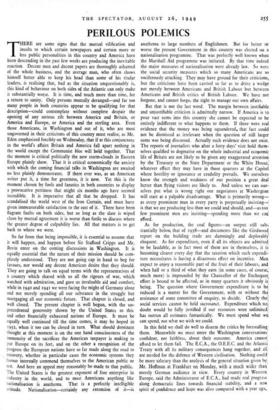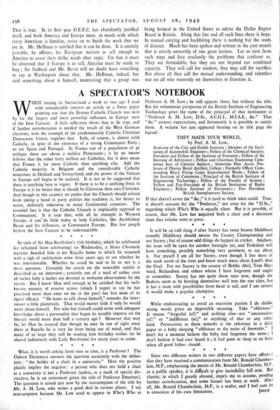PERILOUS POLEMICS
THERE are some signs that the mutual vilification and insults to which certain newspapers and certain more or less public personalities in this country and America have been descending in the past few weeks are producing the inevitable reaction. Decent men and decent papers are thoroughly ashamed of the whole business, and the average man, who often shows himself better able to keep his head than some of his titular leaders, is realising that, bad as the situation unquestionably is, this kind of behaviour on both sides of the Atlantic can only make it substantially worse. It is time, and much more than time, for a return to sanity. Only persons mentally deranged—and far too many people in both countries appear to be qualifying for that description—could contemplate without complete despair the opening of any serious rift between America and Britain, or America and Europe, or America and the sterling area. Even those Americans, in Washington and out of it, who are most ungoverned in their criticisms of this country must realise, as Mr. Eden emphasised forcibly on Wednesday, that if at this conjuncture in the world's affairs Britain and America fall apart nothing in the world except the Communist bloc will hold together. That the moment is critical politically the new storm-clouds in Eastern Europe plainly show. That it is critical economically the anxiety with which the coming financial talks in Washington are awaited no less plainly demonstrates. If there ever was, as an American writer put it, a time for greatness, it is now. Yet this is the moment chosen by fools and fanatics in both countries to display a provocative pettiness that might six months ago have seemed incredible. It is imperative that all that be dropped. It has scandalised the world west of the Iron Curtain, and must have given immeasurable satisfaction to the east of it. There have been flagrant faults on both sides, but so long as the slate is wiped clean by mutual agreement it is worse than futile to discuss where the greater degree of culpability lies. All that matters is to get back to where we were.
So far from that being impossible, it is essential to assume that it will happen, and happen before Sir Stafford Cripps and Mr. Bevin enter on the coming discussions in Washington. It is equally essential that the nature of their mission should be com- pletely understood. They are not going cap in hand to beg for favours, nor would any decent American desire that they should. They are going to talk on equal terms with the representatives of a country which shared with us all the rigours of war, which watched with admiration, and gave us invaluable aid and comfort, while in 194o and 1941 we were facing the might of Germany alone and not merely spending all our substance in the struggle but mortgaging all our economic future. That chapter is closed, and well closed. The present chapter is well begun, with the un- precedented generosity shown by the United States to this and other financially exhausted nations of Europe. It must be equally well continued till the time comes, it may be hoped in 1952, when it too can be closed in turn. What should dominate thought at this moment is on the one hand consciousness of the immensity of the sacrifices the American taxpayer is making to put Europe on its feet, and on the other a recognition of the progress the European nations have so far made along the road to recovery, whether in particular cases the economic systems they favour internally commend themselves to the American public or not. And here an appeal may reasonably be made to that public. The United States is the greatest exponent of free enterprise in industry in the world, and to most Americans anything like nationalisation is anathema. That is a perfectly intelligible ittitude. Nationalisation—certainly any extension of it—is anathema to large numbers of Englishmen. But for better or worse the present Government in this country was elected on a nationalisation programme. That was perfectly well known when the Marshall Aid programme was initiated. By that time indeed the major measures of nationalisation were already law. So were the social security measures which so many Americans are so vociferously attacking. They may have ground for their criticisms, but the criticisms have been carried so far as to drive a wedge not merely between Americans and British Labour but between Americans and British critics of British Labour. We have not forgone, and cannot forgo, the right to manage our own affairs.
But that is not the last word. The margin between justifiable and unjustifiable criticism is admittedly narrow. If America is to pour vast sums into this country she cannot be expected to be entirely indifferent to what happens to them. If there were real evidence that the money was being squandered, that fact could not be dismissed as irrelevant when the question of still larger sums was being discussed. Actually such evidence does not exist. The reports of journalists who after a forty days' visit hold them- selves qualified to dogmatise on the whole industrial and economic life of Britain are not likely to be given any exaggerated attention by the Treasury or the State Department or the White House, whatever effect they may have in those quarters at the Capitol where hostility or ignorance or credulity prevails. We ourselves know the strength and weakness of our position a great deal better than flying visitors arc likely to. And unless we can our- selves put what is wrong right our negotiators at Washington will start at a palpable disadvantage. What is primarily wrong— as every prominent man in every party is perpetually insisting— is that we are producing less than we could and should, and—as too, few prominent men arc insisting—spending more than we can afford.
As for production, the coal figures—an output still sub, stantially below. that of 1938—and documents like the Girdwood report on the building trade arc damningly and deplorably eloquent. As for expenditure, even if all its objects are admitted to be laudable, as in fact most of them are in themselves, it is becoming clearer every day that the taxation which such expendi- ture necessitates is having a disastrous effect on incentive. Men expect to enjoy a reasonable part of the fruit of their labours, and when half or a third of what they earn (in some cases, of course, much more) is impounded by the Chancellor of the Exchequer effort is bound to be affected, as in many quarters it obviously is being. The question where Government expenditure is to be reduced is a matter for the Government, with or without tho assistance of some committee of enquiry, to decide. Clearly the social services cannot be held sacrosanct. Expenditure which no doubt would be fully justified if our resources were unlimited, has outrun all estimates fantastically. We must spend what wei can spend, not what we wish we could.
In this field we shall do well to disarm the critics by forestalling them. Meanwhile we must enter the Washington conversations' confident, not faithless, about their outcome. America cannot, afford to let them fail. The E.C.A., the O.E.E.C. and the Atlantic Treaty with all its military consequences hang together, and all are needed for the defence of Western civilisation. Nothing could be more salutary than the analysis of the general situation given by, Mr. Hoffman at Frankfurt on Monday, with a much wider than merely German audience in view. Every country in Western Europe, said the Administrator of E.C.A., had made real progre,i along democratic lines towards financial stability, and a new spirit of confidence and hope was alive compared with a year ago., That is true. In its first year 0.E.E.0 has abundantly justified itself, and both America and Europe must, in words with which every American is familiar, strive on to finish the work that we are in. Mr. Hoffman is satisfied that it can be done. It is entirely rossible, he affirms, for European nations to sell enough to America to cover their dollar needs after 1952. On that it must be observed that if Europe is to sell, America must be ready to buy ; Sir Stafford and Mr. Bcvin will no doubt have something to say at Washington about that. Mr. Hoffman, indeed, has said something about it himself, mentioning that a group was being formed in the United States to advise the Dollar Export Board in Britain. Along that line and all such lines there is hope. In mutual carping and backbiting there is nothing but the seeds of disaster. Much has been spoken and written in the past month that is utterly unworthy of two great nations. Let us turn from such ways and face resolutely the problems that confront us. They are formidable, but they are not beyond our combined capacity. They will call for wisdom, they may call for sacrifice. But above all they call for mutual understanding, and relentless war on all who wantonly set themselves to frustrate it.































 Previous page
Previous page